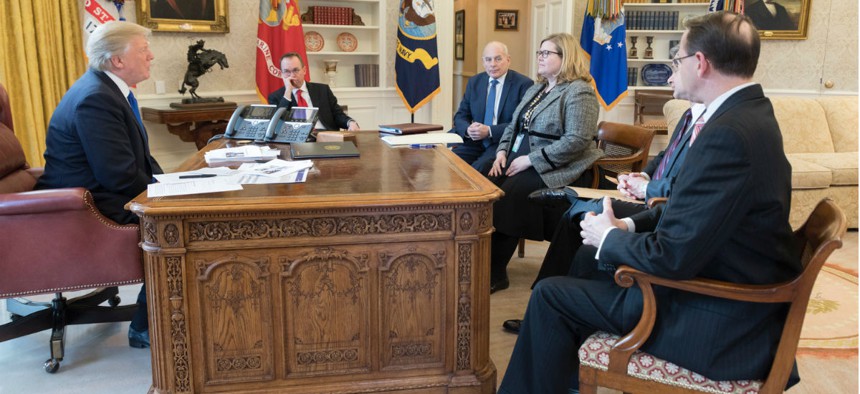
President Trump meets with GSA Administrator Emily Murphy and other administration officials on Jan. 24. White House
New Evidence Suggests Trump’s Coordination With GSA on FBI Headquarters Plan
Photo and emails following Oval Office meeting challenge GSA chief’s testimony to Congress.
Newly released emails and an official White House photo provide evidence suggesting that President Trump himself directed the General Services Administration and the FBI to modify a years-in-the-works plan to move the FBI’s downtown Washington headquarters.
A letter sent Thursday by Rep. Elijah Cummings, D-Md., ranking member of the House Oversight and Government Reform Committee, and four other Democrats, challenged GSA Administrator Emily Murphy on her congressional testimony that she did not discuss the decision to change the relocation plan with the White House.
“Many years before becoming president, Donald Trump expressed interest in the FBI headquarters moving out of Washington, D.C., so he could acquire the land on Pennsylvania Avenue and redevelop the property, which is directly across the street from the Trump International Hotel,” the Democratic lawmakers wrote, with copies to Republican committee chairmen. “However, after he was sworn in as president—and became ineligible as a federal employee to obtain the property—he reportedly became ‘dead opposed’ to the government selling the property, which would have allowed commercial developers to compete directly with the Trump Hotel.”
Some of the conflicts in the record were documented this August in a report from the GSA inspector general, but Murphy has maintained that her April 2018 testimony to Congress about GSA’s plan to rebuild the HQ downtown—released in February—was accurate and that the decision was based on cost considerations.
The IG has now provided Cummings with additional documents, and The New York Times, using the Freedom of Information Act, on Wednesday published for the first time a Jan. 24, 2018, official White House photo showing Murphy and FBI Director Christopher Wray in the Oval Office. The documents contain references to “the project the president wants” and show that top GSA officials promised to “hold our ground” on this proposal “per the president’s instructions” to not sell the downtown property to a commercial developer.
As noted by Cummings, the IG reported that Murphy pushed back against abandoning the suburban location plan, and retained an impression for a while that the relocation would continue. Wray is quoted as saying that if the relocation would not produce cost savings, he’d prefer to remain at the J. Edgar Hoover building, but is “not opposed to a suburban campus site.”
Murphy was also reported to have asked the IG to remove references to her April 2018 testimony from her August 2018 report, which IG Carol Ochoa declined to do.
Internal emails describe the aftermath of the cancellation of procurement for the FBI move announced in July 2017, without an alternative plan in place. GSA Public Buildings Service Commissioner Dan Mathews, after a Dec. 20, 2017, meeting at the White House with Chief of Staff John Kelly and Budget Director Mick Mulvaney, emailed FBI Chief Financial Officer Richard Haley saying, “The meeting took an unexpected turn as soon as we got there.”
Further emails from Mathews asked the White House to put something in writing on a plan to demolish the J. Edgar Hoover building (built in 1974) and construct a new headquarters on the same site, saying, “Ideally I think it would first recap the oval meeting with what POTUS directed everyone to do then ask Emily (GSA) to execute POTUS’s orders,” according to Cummings’ letter.
On Jan. 25, 2018, the GSA administrator’s chief of staff, Brennan Hart, emailed Joseph Lai, special assistant to President Trump, “confirming that the decision to reverse the relocation plan occurred at the White House meeting,” according to the members’ interpretation. Hart wrote: “The president was briefed yesterday on this by the GSA administrator, deputy attorney general and FBI Director and signed off on this path forward.”
The 2017 decision to cancel the well-advanced solicitation of construction firms for bids on building a new campus in one of three sites in suburban Maryland and Virginia irked House members and senators in the Washington area. The current plan to rebuild at the same Pennsylvania Avenue facility “could cost hundreds of millions of dollars more than the long-term relocation plan, but it would accommodate 2,306 fewer employees,” Cummings protested.
“President Trump should have avoided all interactions or communications relating to the FBI headquarters project to prevent both real and perceived conflicts of interest,” Cummings wrote in the letter co-signed by Reps. Gerry Connolly, D-Va.; Dina Titus, D-Nev.; Mike Quigley, D-Ill.; and Peter DeFazio, D-Ore. “He should not have played any role in a determination that bears directly on his own financial interests with the Trump Hotel. The General Services Administration also should have taken steps to wall off the decision from improper influence.”
A GSA spokeswoman said in a statement:
As previously testified by GSA and the FBI, the leadership team at the FBI made the decision to keep its headquarters at the current Pennsylvania Avenue location. A number of emails referenced in today’s congressional letter are taken out of context and refer to the project's funding approach, not the location decision. Suggestions that those emails indicate presidential involvement in the location decision are inaccurate. GSA stands by its testimony and the cost analysis proposed in the joint revised plan submitted to Congress in February.
The lawmakers asked Murphy to provide a timetable and all relevant documents by Nov. 1.
Separately, the story behind the Trump administration’s handling of the FBI headquarters will be among the top priorities in the coming months for American Oversight, a nonprofit legal group that focuses on agency transparency. At a Wednesday briefing with reporters, the group’s leaders said they have been actively filing FOIA requests for documents on the canceled move.
This story has been updated with a statement from GSA.







